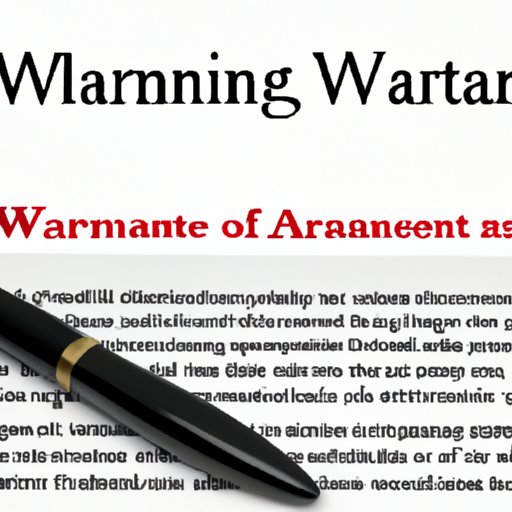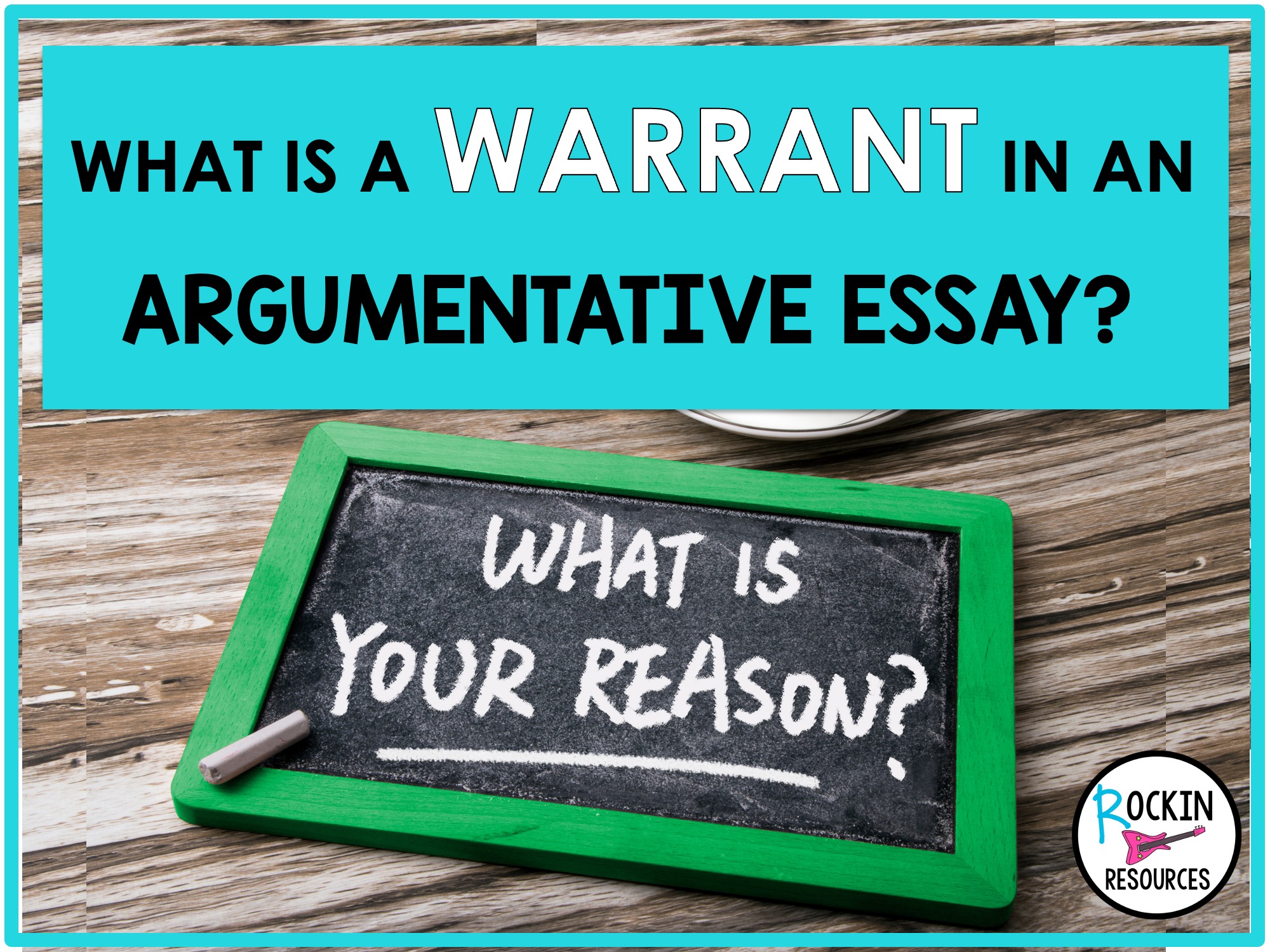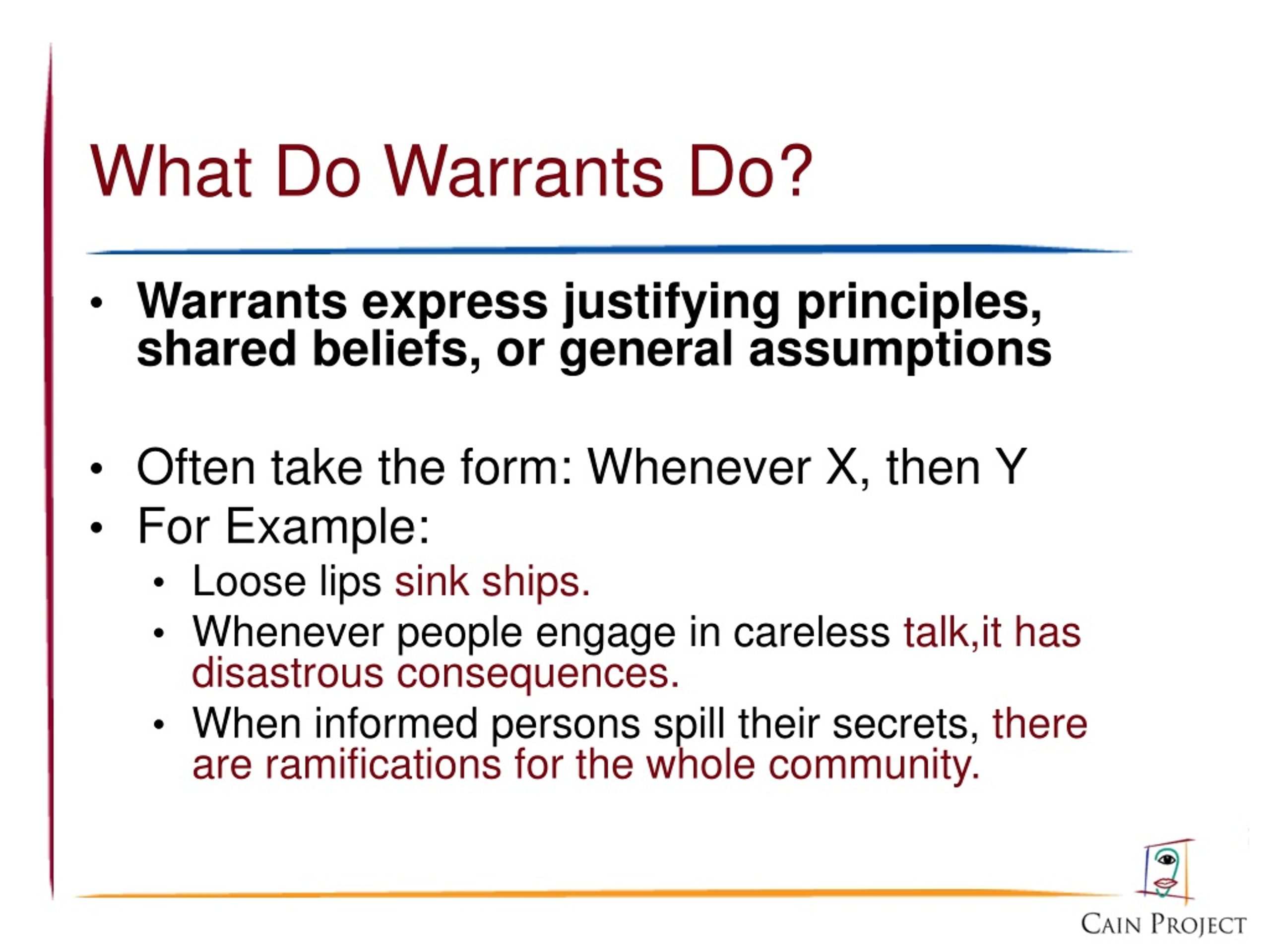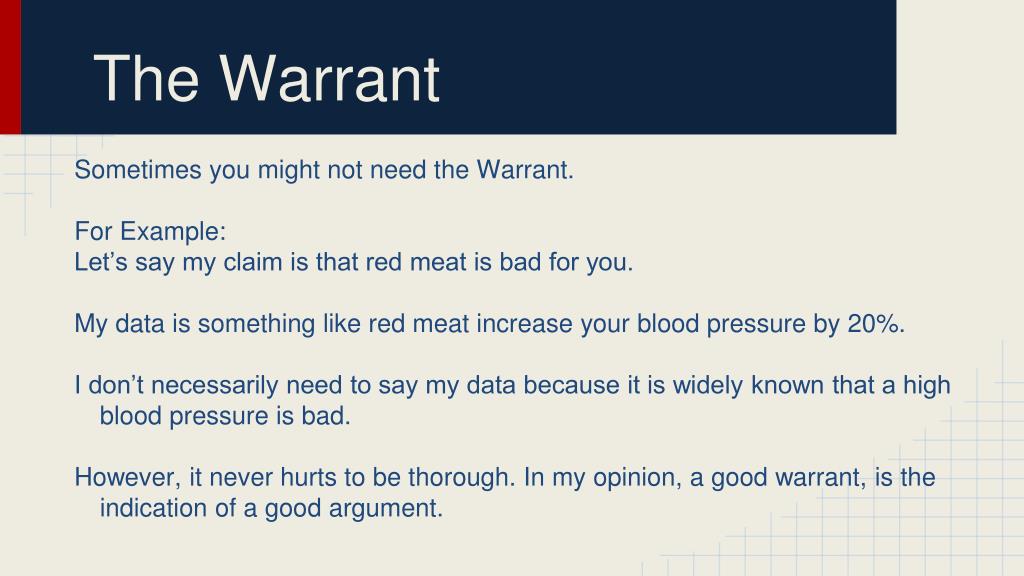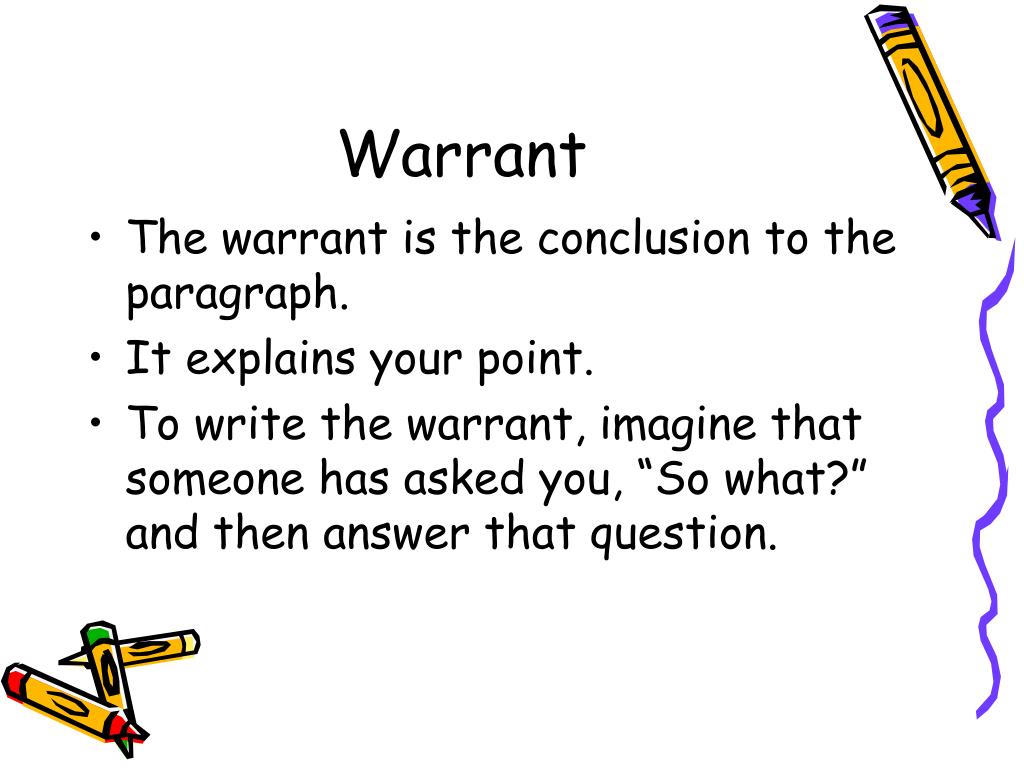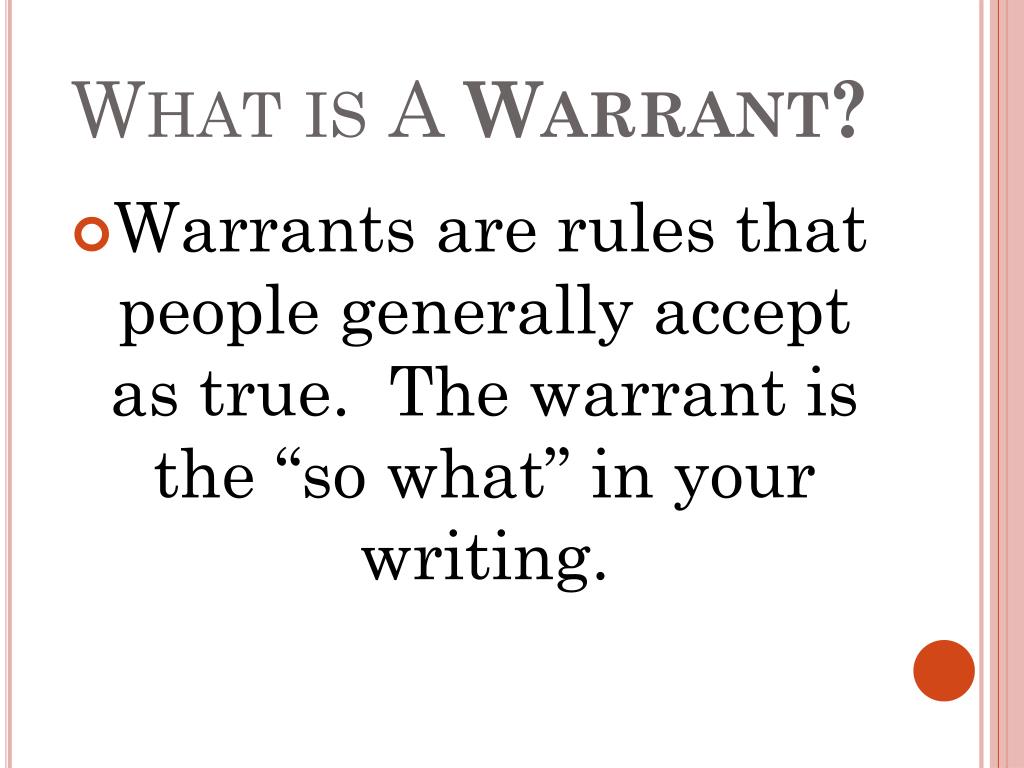What Is A Warrant In English Writing - Claim/evidence/warrant (cl/ev/wa) helps you articulate logical—and so persuasive—arguments. What are claims, supports, and warrants? In rhetorical analysis, a claim is something the author wants the audience to believe. This system has three basic elements (and. A warrant in english writing refers to the underlying assumption or principle that supports a claim or argument. A warrant, simply put, is the assumption that your reader needs to agree with in order to find your evidence strong enough to support your claim. A warrant, simply put, is the assumption that your reader needs to agree with in order to find your evidence strong enough to support your claim.
This system has three basic elements (and. In rhetorical analysis, a claim is something the author wants the audience to believe. A warrant, simply put, is the assumption that your reader needs to agree with in order to find your evidence strong enough to support your claim. A warrant in english writing refers to the underlying assumption or principle that supports a claim or argument. What are claims, supports, and warrants? A warrant, simply put, is the assumption that your reader needs to agree with in order to find your evidence strong enough to support your claim. Claim/evidence/warrant (cl/ev/wa) helps you articulate logical—and so persuasive—arguments.
A warrant in english writing refers to the underlying assumption or principle that supports a claim or argument. A warrant, simply put, is the assumption that your reader needs to agree with in order to find your evidence strong enough to support your claim. A warrant, simply put, is the assumption that your reader needs to agree with in order to find your evidence strong enough to support your claim. In rhetorical analysis, a claim is something the author wants the audience to believe. This system has three basic elements (and. What are claims, supports, and warrants? Claim/evidence/warrant (cl/ev/wa) helps you articulate logical—and so persuasive—arguments.
Exploring What is Warrant in Writing Definition, Purpose & Examples
This system has three basic elements (and. In rhetorical analysis, a claim is something the author wants the audience to believe. Claim/evidence/warrant (cl/ev/wa) helps you articulate logical—and so persuasive—arguments. What are claims, supports, and warrants? A warrant, simply put, is the assumption that your reader needs to agree with in order to find your evidence strong enough to support your.
WHAT IS A WARRANT IN AN ARGUMENTATIVE ESSAY? Rockin Resources
A warrant in english writing refers to the underlying assumption or principle that supports a claim or argument. In rhetorical analysis, a claim is something the author wants the audience to believe. A warrant, simply put, is the assumption that your reader needs to agree with in order to find your evidence strong enough to support your claim. This system.
PPT Writing Module Three Five Essential Parts of Argument PowerPoint
In rhetorical analysis, a claim is something the author wants the audience to believe. This system has three basic elements (and. A warrant in english writing refers to the underlying assumption or principle that supports a claim or argument. A warrant, simply put, is the assumption that your reader needs to agree with in order to find your evidence strong.
What is a Warrant in Writing? Exploring Different Types and Their Legal
A warrant, simply put, is the assumption that your reader needs to agree with in order to find your evidence strong enough to support your claim. A warrant, simply put, is the assumption that your reader needs to agree with in order to find your evidence strong enough to support your claim. A warrant in english writing refers to the.
Exploring What is Warrant in Writing Definition, Purpose & Examples
A warrant, simply put, is the assumption that your reader needs to agree with in order to find your evidence strong enough to support your claim. A warrant in english writing refers to the underlying assumption or principle that supports a claim or argument. Claim/evidence/warrant (cl/ev/wa) helps you articulate logical—and so persuasive—arguments. This system has three basic elements (and. A.
PPT How to write an Essay PowerPoint Presentation, free download ID
A warrant, simply put, is the assumption that your reader needs to agree with in order to find your evidence strong enough to support your claim. What are claims, supports, and warrants? Claim/evidence/warrant (cl/ev/wa) helps you articulate logical—and so persuasive—arguments. A warrant in english writing refers to the underlying assumption or principle that supports a claim or argument. A warrant,.
PPT Essay One PowerPoint Presentation, free download ID310383
A warrant, simply put, is the assumption that your reader needs to agree with in order to find your evidence strong enough to support your claim. What are claims, supports, and warrants? A warrant, simply put, is the assumption that your reader needs to agree with in order to find your evidence strong enough to support your claim. In rhetorical.
PPT Argumentative Writing PowerPoint Presentation, free download ID
A warrant, simply put, is the assumption that your reader needs to agree with in order to find your evidence strong enough to support your claim. What are claims, supports, and warrants? In rhetorical analysis, a claim is something the author wants the audience to believe. A warrant in english writing refers to the underlying assumption or principle that supports.
What Are The Warrants Of A Claim
Claim/evidence/warrant (cl/ev/wa) helps you articulate logical—and so persuasive—arguments. A warrant, simply put, is the assumption that your reader needs to agree with in order to find your evidence strong enough to support your claim. What are claims, supports, and warrants? A warrant in english writing refers to the underlying assumption or principle that supports a claim or argument. In rhetorical.
PPT Argumentative Writing Based upon the Stephen Toulmin Model For
In rhetorical analysis, a claim is something the author wants the audience to believe. What are claims, supports, and warrants? A warrant, simply put, is the assumption that your reader needs to agree with in order to find your evidence strong enough to support your claim. A warrant, simply put, is the assumption that your reader needs to agree with.
A Warrant, Simply Put, Is The Assumption That Your Reader Needs To Agree With In Order To Find Your Evidence Strong Enough To Support Your Claim.
Claim/evidence/warrant (cl/ev/wa) helps you articulate logical—and so persuasive—arguments. This system has three basic elements (and. A warrant in english writing refers to the underlying assumption or principle that supports a claim or argument. What are claims, supports, and warrants?
A Warrant, Simply Put, Is The Assumption That Your Reader Needs To Agree With In Order To Find Your Evidence Strong Enough To Support Your Claim.
In rhetorical analysis, a claim is something the author wants the audience to believe.
